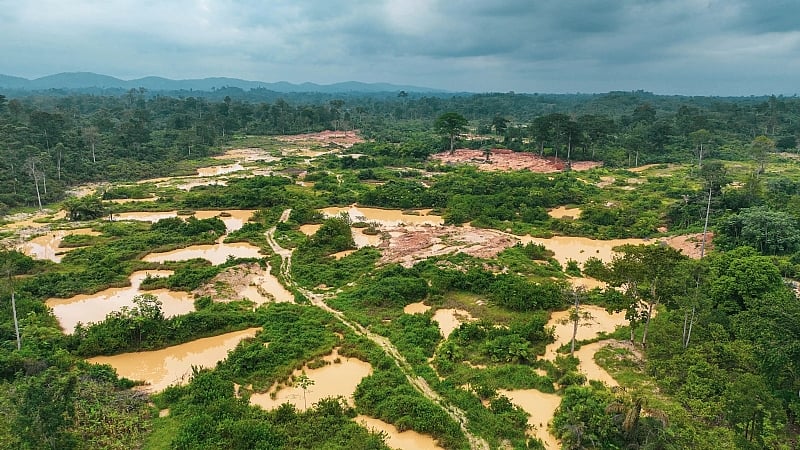In recent discussions regarding the rampant illegal mining activities known as “galamsey,” Julius Kwame Anthony, a spokesperson for the National Democratic Congress (NDC) on Youth Development, emphasized that the key to resolving this pressing issue lies in voting out the current government, the New Patriotic Party (NPP). Anthony’s remarks came in light of recent statements made by NPP figures, particularly Dr. Mathew Opoku Prempeh, who suggested that the party would return confiscated excavators to illegal miners should they regain power. This sentiment appears to reveal an underlying NPP strategy that, according to Anthony, facilitates the continuation of illegal mining operations rather than working towards their eradication.
Anthony referred to further controversial comments made by Dr. Nana Yaw Afriyie of the NPP, who allegedly stated that the party had no intentions of ending galamsey activities. Such statements, according to Anthony, bolster the notion that the NPP is complicit in fostering an environment where illegal mining can thrive. He pointed out that the government’s current stance seems to undermine the substantial damage that galamsey inflicts on the environment and local communities. The persistence of these illegal activities, as Anthony argues, can be traced back to a lack of political will from the current administration to enforce the law.
The spokesperson further criticized President Akufo-Addo’s handling of illegal mining, specifically regarding the prosecution of foreign nationals involved in these operations. Anthony claims that the president’s frequent appeals for financial aid from foreign countries hinder his administration’s ability to take decisive action against foreigners caught engaging in illegal mining. This lack of accountability was exemplified by the case of Aisha Huang, a notorious figure in the galamsey industry, who allegedly faced no repercussions for her illegal activities in Ghana. Anthony’s remarks suggest a broader narrative of governmental failure, where international relations take precedence over enforcing domestic laws.
The impact of galamsey on Ghana’s environment and economy has reached critical levels, with widespread deforestation, pollution of water bodies, and threats to biodiversity. Anthony conveyed a sense of urgency during a recent TV3 panel discussion, stating that the ongoing situation reflects a systemic breakdown under the current administration. He criticized President Akufo-Addo for not only failing to prosecute offenders but also for creating an atmosphere of impunity where individuals and corporations can exploit natural resources without fear of legal consequences.
The NDC spokesperson’s comments underscore a growing frustration among Ghanaians over the perceived inaction towards illegal mining. The struggle against galamsey has become a significant political issue, with many viewing the upcoming elections as a pivotal moment to enact change. Anthony’s call to action reflects a broader sentiment within the NDC, which seeks to capitalize on public discontent with the NPP’s handling of environmental policies and corruption, positioning themselves as the viable alternative in the upcoming elections.
In conclusion, Julius Kwame Anthony’s statements highlight the intertwined issues of governance, environmental degradation, and political accountability in Ghana. With mounting challenges posed by illegal mining, the NDC is leveraging this critical moment to advocate for significant political changes that could potentially reshape the future of Ghana’s natural resources. Anthony’s assertion that the resolution to the galamsey crisis is contingent upon the removal of the NPP from power serves as both a critique of current government policies and a rallying cry for the NDC and its supporters as they navigate the complexities of the upcoming elections.


